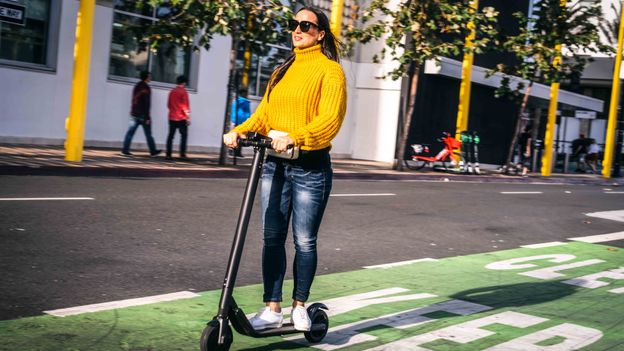
So, are e-scooters the sustainable travel we need? “The key is for e-scooters to be one more part of a flexible, multi-modal transport system that gives people more affordable and sustainable mobility choices,” says Maruxa Cardama, secretary-general of the Slocat Partnership on Sustainable, Low-Carbon Transport.
“E-scooters can be carbon neutral, but if they do not replace more carbon-intensive modes, they will have little positive impact on urban transport decarbonisation,” explains Voi’s sustainability lead Sarah Badoux. To target a modal shift from cars, widespread presence – convenient access – is key. Lime, for instance, also partners with Uber and Google Maps so that when people plan journeys, e-scooters appear as a viable alternative to car use.
Linking in with public transport is also vital. “Research shows that the best way to get people to leave their cars at home is not improved public transport, but improved access to public transport,” says Voi’s Badoux, whose company has partnerships with public transit authorities across Europe. Marion Lagadic, a project manager at 6t, which conducted the French e-scooter surveys, agrees. “One could hypothesise that e-scooters not only make the first-mile or last-mile possible for those users who live far from stations, they also offer that little bit of fun that makes an intermodal trip attractive,” she says.
In her report on e-scooters and climate action, C40’s Mahoney recommends “cities should prioritise the requirements of people who walk, cycle or use public mass transit, over the requirements of e-scooters.” Some, however, believe the embracing of e-scooters can help build pressure for cycling infrastructure. “When tens of thousands of e-scooters were dropped on our streets, and forbidden to ride on the sidewalk, this need for dedicated alternative mobility space suddenly became visible to everyone,” says 6t’s Lagadic. “E-scooters provide an extra critical mass that justifies further developing the cycling lane network.”
Aimee Gauthier, chief knowledge officer at the Institute for Transport Development and Policy, agrees. “If public acceptance is higher for e-scooters, this could also be an avenue for getting more dedicated bike lanes built on the street for these modes.” E-scooters might even help people get on to bikes, Gauthier suggests. “We hope for them to be a gateway to cycling. We’ve seen that a lot of people who don’t feel comfortable on bikes did try e-scooters, so there’s a sense that for some, the barrier to entry may be lower than cycling and an attractive alternative to cars.”
E-scooters are still relative newcomers to the streets, but their story has evolved rapidly. Through wider use, sustainability commitments and regulations, they have started to shake off that tech-gadget novelty and be treated as a more serious transport mode, and one with added benefits in an era of social distancing. But making sure e-scooter use is inclusive, safe and sustainable – and complements, if not actively supports, other green forms of travel – takes a lot of work, from private companies and governments alike. Much of that work is yet to come.
Being tech-led, e-scooters are considered a disruptive form of transport – the kind of “innovation” that necessarily splits opinion. But it’s worth noting that even when the bicycle burst onto the scene in the late 19th Century, it was considered “immoral”. Over a hundred years on, we no longer grapple with cycling’s morality but are still struggling to secure environments and infrastructure that sagely and sustainably support it. Let’s hope it doesn’t take so long for other, newly emerging forms of micro-mobility – all of which play a role if we want to dismantle the dominance of fossil-fuelled cars.
--
The emissions from travel it took to report this story were 0kg CO2: the writer interviewed sources remotely. Find out more about how we calculated this figure here.
--
Join one million Future fans by liking us on Facebook, or follow us on Twitter or Instagram.
If you liked this story, sign up for the weekly bbc.com features newsletter, called “The Essential List”. A handpicked selection of stories from BBC Future, Culture, Worklife, and Travel, delivered to your inbox every Friday.
"electric" - Google News
June 09, 2020 at 06:32AM
https://ift.tt/3f8uURY
Our love-hate relationship with electric scooters - BBC News
"electric" - Google News
https://ift.tt/2yk35WT
https://ift.tt/2YsSbsy
Bagikan Berita Ini














0 Response to "Our love-hate relationship with electric scooters - BBC News"
Post a Comment